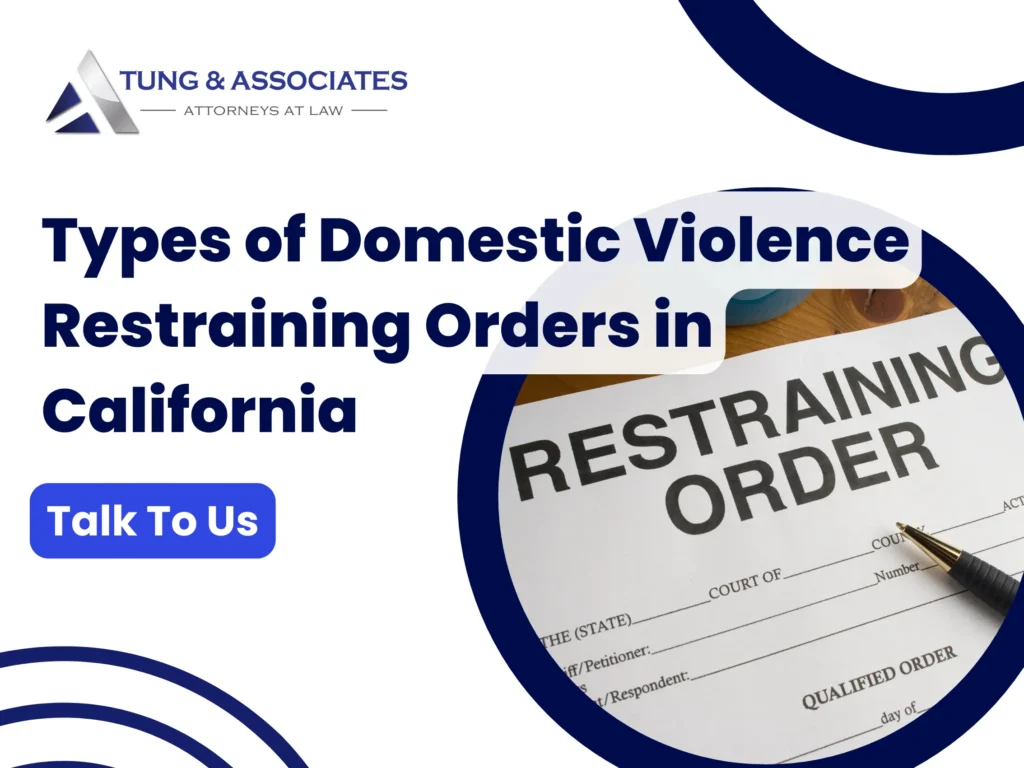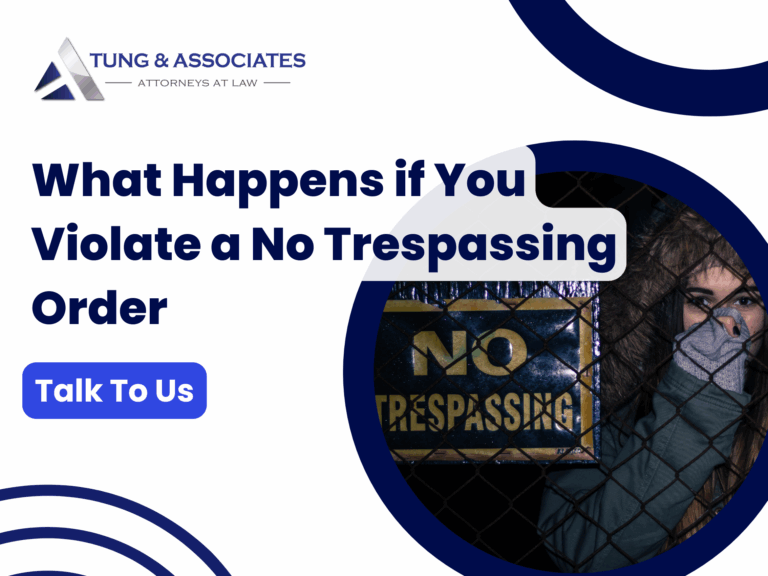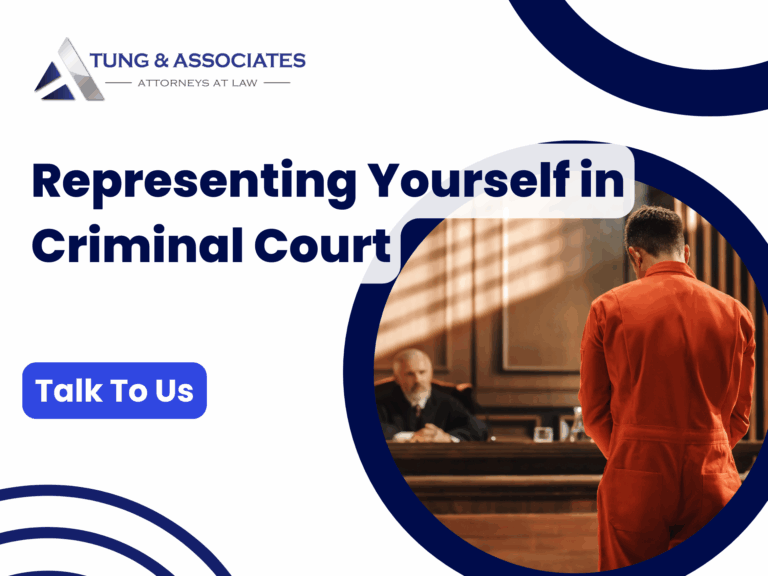At Tung & Associates, our domestic violence attorneys, led by Pasadena attorney Antony Tung, are here to help victims take immediate legal steps toward safety and stability. We provide fast, compassionate support for those seeking restraining orders, including emergency, temporary, and long-term protection.
With deep knowledge of California’s domestic violence laws and strong ties to the Pasadena courts, we handle both common and complex cases, from intimate partner abuse to elder harm and tech-based stalking.
Whether you’re facing threats, harassment, or physical violence, we act quickly to protect your rights, guide you through the legal process, and help you move forward with confidence.
What Is a Domestic Violence Restraining Order and Why Might You Need One?
A Domestic Violence Restraining Order (DVRO) is a legal tool designed to protect victims of abuse from further harm. In California, a DVRO can order an abuser to stop all contact, stay away from your home or workplace, move out of a shared residence, surrender firearms, and follow other conditions that ensure your safety.
Abuse isn’t just physical. Under California Family Code § 6203, abuse includes stalking, threats, harassment, sexual assault, and emotional control. If these actions cause harm or fear, you may qualify for a DVRO, even without physical injury.
DVROs are available when the abusive person is someone with whom you have an intimate or close relationship, including a spouse, ex, dating partner, live-in partner, the other parent of your child, or a close family member like a parent or sibling. If the person doesn’t fall into one of these categories, there are other types of restraining orders that may apply.
A DVRO provides immediate relief and long-term protection. Orders can prohibit all contact, require the abuser to stay a certain distance away, and give you temporary control of a home, car, or even child custody. This kind of court-ordered protection sends a clear message: abuse will not be tolerated, and you have the full force of the law behind you.
For many clients, a DVRO is not just a document. It’s the first real step toward safety and independence. We’re here to help you take that step with clarity and strength.
Who Can Get a Domestic Violence Restraining Order in California?
Not everyone qualifies for a domestic violence restraining order. If you have a close or intimate relationship with the person harming you, you likely do. California law (Family Code § 6211) limits DVRO eligibility to specific relationship types, focusing on domestic or familial connections.
You can request a DVRO against someone who is:
- A current or former spouse or domestic partner
- A current or former boyfriend/girlfriend or fiancé(e)
- A person you’ve lived with in a romantic relationship
- The other parent of your child
- A close family member, such as a parent, child, grandparent, sibling, or in-law
If the abuse is coming from someone outside of these relationships, like a roommate, neighbor, coworker, or distant relative, you won’t qualify for a DVRO. However, other restraining orders, such as civil harassment orders, may still be available.
Understanding the relationship requirement is key. If your situation fits, a DVRO offers strong legal protection. If not, we’ll help you explore the alternatives. Either way, you deserve to feel safe, and we’re here to make sure the law works for you.
What Types of Domestic Violence Restraining Orders Are Available in California?
California offers several types of restraining orders to address different levels of urgency and danger. Each serves a specific purpose, depending on whether you need immediate protection or long-term safety. Understanding the differences helps ensure you get the right kind of legal protection when you need it most.
What Is an Emergency Protective Order (EPO)?
An EPO is issued by a judge at the request of law enforcement, usually at the scene of a domestic violence call. It takes effect immediately and can order the abuser to stay away, move out, or have no contact with you. EPOs are short term and typically last only 5 to 7 days. They give you time to file for a long-term order in family court. If police have responded to an incident, they may already have helped secure an EPO on your behalf.
What Is a Temporary Restraining Order (TRO)?
A TRO is issued by a family court judge after you file for a DVRO. It provides protection until your court hearing, usually lasting about 20 to 25 days. If your request shows immediate danger, the judge can issue a TRO the same day. This order may include no-contact rules, stay away distances, and custody or housing arrangements to protect you during the waiting period before your full hearing.
What Is a “Permanent” Restraining Order?
Despite the name, these aren’t truly permanent, but they can last up to 5 years. A permanent restraining order, also called a Restraining Order After Hearing, is issued after your court hearing if the judge finds that ongoing protection is justified. These orders can be renewed, extended, or made longer under certain conditions, especially in cases of repeated abuse or threats.
What Is a Criminal Protective Order (CPO)?
A CPO is issued by a criminal court as part of a domestic violence criminal case. If your abuser has been arrested and charged, the judge may issue a CPO to prevent contact during and after prosecution. A CPO can remain in effect throughout the case and up to 3 years after conviction. It adds another layer of legal enforcement and often works alongside a DVRO for added safety.
These restraining orders all serve the same goal. The right order depends on your situation, the level of danger, and whether criminal charges are involved. Our attorneys will help you determine which one fits your needs and make sure it’s filed and enforced properly.
Are There Other Types of Restraining Orders Besides Domestic Violence Orders?
Yes. California law provides several additional types of restraining orders for people who don’t meet the relationship criteria for a Domestic Violence Restraining Order (DVRO) but still need protection. These orders are often used in cases involving harassment, workplace threats, elder abuse, or firearm safety concerns.
Elder or Dependent Adult Abuse
California protects individuals who are especially vulnerable. If you’re 65 or older, or between 18 and 64 with certain disabilities, and you’re being abused, you can seek an elder or dependent adult abuse restraining order. These are commonly used in cases where caretakers or family members take advantage of a person’s age or condition.
Workplace Violence
In situations where an employee is being stalked, threatened, or attacked at work, their employer can request a workplace violence restraining order. This protects not just the employee but the entire workplace from someone posing a danger. It’s especially useful when personal relationships spill into the workplace.
Gun Violence
When someone poses a credible danger of using firearms to harm themselves or others, family members or law enforcement can petition for a gun violence restraining order. It allows the court to temporarily remove firearms from that person and block them from buying more.
School Violence
In rare but serious cases, private postsecondary school officials (like deans or security staff) can request this type of restraining order if a student or staff member is threatened with violence. While not commonly used, it reflects California’s commitment to proactive safety in educational settings.
Each of these orders fills a gap where a DVRO might not apply. Our Pasadena domestic violence attorneys will help clients understand their legal options and file the right kind of order to ensure maximum protection, whether the threat comes from a family member, coworker, or someone else entirely.
How Do I Obtain a Domestic Violence Restraining Order in California?
Getting a restraining order is a step-by-step process that balances speed with due process. Below is the typical path victims follow and how we guide and protect you at each stage.
1. What Happens When You File the Paperwork?
You start by completing and filing the court’s DVRO forms at the Los Angeles County Superior Court (Pasadena branch for local residents). If your declaration shows immediate danger, the judge often issues a Temporary Restraining Order (TRO) on the same day, giving you short term protection for about 20 to 25 days. We draft these forms for you, attach evidence such as photos or police reports, and make sure every detail supports your need for safety.
2. How Is the Abuser Officially Notified?
After filing, the paperwork must be personally served on the abuser by someone 18 or older. This is often a sheriff or professional process server. Service makes the TRO enforceable and tells the abuser when to appear in court. We coordinate service, track attempts, and request extra time from the judge if the abuser tries to avoid being served.
3. What Should You Expect at the Court Hearing?
A hearing usually takes place within three weeks. You (or we, on your behalf) present evidence and testimony; the abuser can respond. Hearings are brief but decisive. Our attorneys handle the questioning and legal arguments, so you aren’t forced to confront the abuser directly.
4. What If the Judge Grants the Final Order?
If the judge finds ongoing risk, a ‘Restraining Order After Hearing’ is issued for up to five years. It continues the no-contact rules, stay away distances, custody terms, and firearm surrender. We provide certified copies to you, local police, your child’s school, and any workplace named in the order to ensure immediate enforcement.
5. How Do You Maintain Protection Long Term?
Orders can be renewed before they expire, modified if circumstances change, or enforced if violated. We calendar renewal deadlines, file modifications, and work with law enforcement if the abuser ignores the order. Your safety plan doesn’t end with the court date – we stay involved to keep you protected.
What Happens at a Restraining Order Hearing and How Do We Protect You There?
A restraining order hearing is a short but decisive court session where the judge decides whether to extend your protection. Hearings usually occur two to three weeks after you file, so the judge can review a Temporary Restraining Order and hear both sides.
We appear with you, present clear evidence and explain why long-term protection is essential. Our presence means you rarely need to speak directly to the abuser, lowering stress and preventing intimidation.
The abuser (the “respondent”) may testify or bring witnesses, but we cross-examine them and challenge any attempts to downplay the abuse. The judge then issues a Restraining Order After Hearing that can last up to five years and include no-contact rules, stay away distances, custody terms, and firearm surrender.
If the judge asks questions, we guide your answers so every detail supports your safety. When the order is granted, we give certified copies to law enforcement, schools, and workplaces to ensure immediate enforcement and peace of mind.
How Can You Get Legal Help Right Now?
No one should wait another day to feel safe. If you’re facing abuse in Pasadena, Los Angeles County, or nearby communities, call us at (626) 416-4668 for a confidential consultation.
We’ll listen to your story, outline urgent safety steps, and, if needed, file for emergency protection the same day. Let us shoulder the legal burden while you focus on staying safe and rebuilding your life.
Take the first step toward peace and protection. Contact Tung & Associates now and let our attorneys put the full force of California law on your side.





